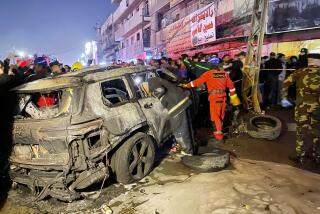U.S. drone strike in northwest Pakistan kills top Taliban commander
ISLAMABAD, Pakistan -- A U.S. drone strike in northwest Pakistan killed a top Taliban commander responsible for engineering attacks on U.S. and NATO forces in Afghanistan, Pakistani military and intelligence sources said Thursday.
The death of Pakistani Taliban commander Maulvi Nazir deals a significant blow to insurgent ranks that use Pakistan’s rugged tribal regions along the border with Afghanistan as sanctuary from which to launch assaults on Western troops battling Afghan Taliban fighters. Though Nazir was affiliated with the Pakistani Taliban, he had long maintained a peace pact with the Pakistani military and had instead focused his efforts on U.S.-led forces in Afghanistan.
Nazir was in a house in Angoor Adda, a small village in the South Waziristan tribal region, when the drone strike occurred at about 10:40 p.m. Wednesday night, killing Nazir and nine other people, military sources and local tribal leaders said. Later, Nazir’s death was announced on loudspeakers at local mosques in South Waziristan, according to local tribesmen. Nazir’s top deputy, Rapah Khan, was also killed in the strike.
TIMELINE: Targeted killings under Obama
Another U.S. drone strike early Thursday in neighboring North Waziristan killed three suspected militants, Pakistani military sources said. Among those killed was Shah Faisal, a militant commander under Pakistani Taliban leader Hakimullah Mahsud, according to military sources. Unlike Nazir’s Taliban faction, Mahsud’s insurgent group regards the Pakistani government as its primary enemy and is responsible for waves of suicide bombings and other terror acts across the country in recent years. Faisal and the other militants were in a vehicle when missiles from the drone struck, the sources said.
Nazir survived an assassination attempt last November when a teenage suicide bomber ran toward him as he was approaching an office he uses in Wana, South Waziristan’s administrative headquarters, and detonated an explosives-filled vest. The blast wounded Nazir and killed seven other people. Nazir’s men blamed Mahsud’s rival Pakistani Taliban faction for the attack and killed two of Mahsud’s fighters in retaliation.
In October 2011, drone strikes in South Waziristan killed Nazir’s younger brother, Hazrat Omar, and one of Nazir’s top deputies, Khan Mohammed.
Last summer, Nazir was one of two Taliban commanders in the Waziristan tribal regions to issue decrees against polio vaccination efforts in their areas. Nazir said his decision to ban the vaccinations was motivated by Washington’s ongoing drone campaign and a phony inoculation program orchestrated by the CIA in 2011 to help track down Osama bin Laden. Hafiz Gul Bahadur, a North Waziristan Taliban leader, issued a similar decree in his region. Authorities believe that the Taliban may be behind the recent murders of several polio vaccination workers across the country.
The frequency of U.S. drone strikes in Pakistan’s troubled tribal regions along the border with Afghanistan has tapered off from a peak of 117 in 2010. In 2011, the U.S. carried out 64 drone strikes in Pakistan, and last year that number dropped to 46, according to the Long War Journal website, which tracks drone activity.
Although Islamabad vehemently opposes the U.S. drone program and regards it as a blatant encroachment on Pakistan’s sovereignty, Washington still views the tactic as an effective tool against Al Qaeda and Taliban militants hiding in the country’s tribal belt. Last year, drone strikes killed Al Qaeda’s second-in-command at the time, Abu Yahya al-Libi, and Badruddin Haqqani, a top commander for the Haqqani network, a wing of the Afghan Taliban responsible for a series of large-scale suicide bombings and attacks on Western forces in Afghanistan.
ALSO:
In Egypt, young revolutionaries feeling despair
U.N. says more than 60,000 have died in Syrian civil war
Girl killed, hundreds hurt in Philippines New Year’s Eve revelry
Special correspondent Naseer Azam Mahsud in Dera Ismail Khan contributed to this report.
More to Read
Sign up for Essential California
The most important California stories and recommendations in your inbox every morning.
You may occasionally receive promotional content from the Los Angeles Times.










